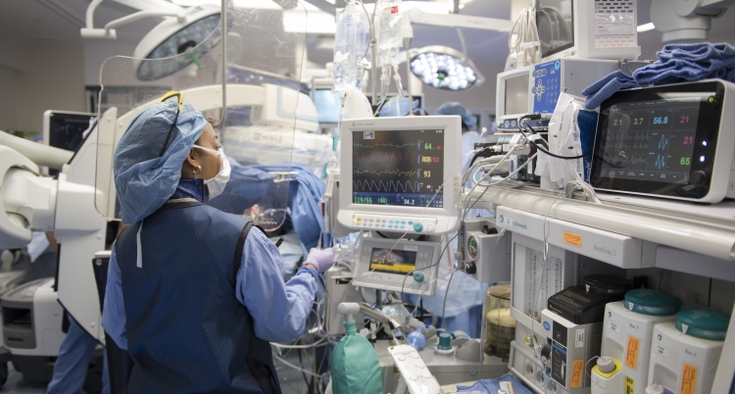Left ventricular assist device (LVAD) surgeries, an advanced implant procedure for heart failure patients, are now being performed by the team at Novant Health Heart & Vascular Institute - Wilmington Main. Having the implant available ensures that coastal patients no longer need to travel to partners in the Triangle for the surgery, which requires a hospital stay of two to three weeks.
As of December 2023, Novant Health physicians had successfully performed two LVAD surgeries, implanting the HeartMate 3 LVAD.
“When it comes to managing heart failure patients, this is at the top in terms of advanced therapies,” said Dr. John Rommel, an advanced heart failure and transplant physician who has been working with colleagues since 2016 to prepare for and add LVAD surgery to Novant Health programming. “It went well because our staff has been training for this. A lot of folks have laid the groundwork for the infrastructure.”
Novant Health’s infrastructure spans preoperative, operative and postoperative capabilities for successful LVAD implantation and management.
Since 2016, the Novant Health team has worked to:
- Master the fundamentals of managing outpatient and inpatient heart failure.
- Improve the management of non-mechanical durable support, including the Impella 5.5 and balloon pumps.
- Receive accreditation to provide LVAD surgery.
- Start to find the right patients for the surgery.
“This isn’t provided everywhere because what you really need is infrastructure,” Rommel said. “It’s not one-and-done surgery, where it’s performed once, and the patient is fine for the rest of their life and never needs to be seen again. There’s really that connection between the patient and the hospital. The patient has to commit to holding up their end of the bargain, and the physician has to commit to holding up their end of the bargain. That means being available 24/7, having heart failure support and surgical support. Not everyone is equipped to have that infrastructure in place.”
LVAD implantation improves survival and well-being for patients with end-stage heart failure who are not candidates for cardiac transplantation.
“We’re seeing LVAD technology getting better,” Rommel said. Studies show 60% of patients surviving five years after LVAD implantation. “The LVAD is an option for people who are not transplant candidates. It’s an option for these patients to feel better, live longer, be out of the hospital and have improvement in their quality of life.”
The goal of LVAD surgery is to ensure patients can feel better than they did before.
Patients generally experience quality of life improvements at three months post-implantation. “These patients are able to walk farther, to breathe better, to safely stay out of the hospital, to go back to work, to do things they want to do,” Rommel said.
Patients who receive an LVAD implant are supported by a complete care team at Novant Health, in addition to their heart failure provider and cardiothoracic surgeon.
Care starts with prehabilitation prior to surgery and continues during the two to three weeks of postoperative hospitalization.
- Cardiac rehabilitation experts and physical therapists support the patient before and after their surgery with focuses on strength, nutrition and motivation.
- Operating room staff and anesthesiologists are prepared for any scenario during surgery.
- Cardiovascular ICU nurses are at the bedside nonstop during recovery.
- Respiratory therapists are on standby for any complications with anatomy and vasculature after surgery. (There were no complications for the first two LVAD patients.)
Patients are empowered to manage the LVAD on their own.
“The team trains the patients, getting them ready for the next step in their care,” Rommel said. “Every day, the team gets them to do a little more of the LVAD management themselves. Every day, the team gets them to push their physical limits a little bit.”
Once home, patients work with their heart failure physician to get healthier and stronger.
“We make sure to get their fluid levels right, to build back strength and nutrition, and to get them back on their medication regimen to protect their heart, including blood thinners and heart failure medications,” Rommel said. “We’re watching for rhythm issues, bleeding issues and infection issues throughout the process.”
The Novant Health team will continue to expand LVAD implantation in 2024.
“We want to get this option in front of as many patients as appropriate and make sure they understand the choices they have,” Rommel said. “The tragedy is when people get too sick before they make a choice. We want to expand the number of providers who are comfortable managing these devices and make sure the medical community is prepared to care for these patients when they return.”





